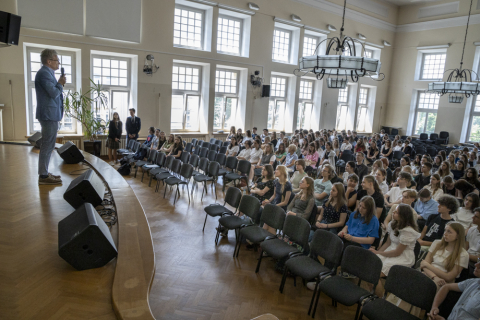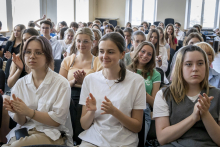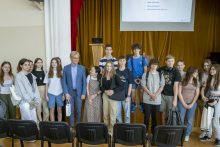- The question of why some people live shorter and others live longer was posed back in the first years after the war. It was asked by researchers affiliated with Boston University - the Rector told the high school students. - In the 1950s, they began an epidemiological project called the Framingham Heart Study, which continues to this day. Framingham, is a town near Boston with a demographic structure equivalent to the population of the United States. The leaders of the project were William Kannel and Thomas Dawber. It was then that it was first proven that those who eat a lot, move little and smoke cigarettes live shorter lives.
So it turns out that the length of our lives is determined to the greatest extent by our lifestyles. This was confirmed by the so-called Lalonde Report.
- Marck Lalonde, Canada's Minister of Health, appointed a group of specialists who analyzed a wealth of data and created a document called the Lalonde Report. It was published in the 1970s - the professor explained. - It showed that life expectancy is determined to the greatest extent (40-60 percent) by lifestyle. The social environment was 20-25 percent, access to modern restorative medicine 10-20 percent, while genetic factors only 5-10 percent.
Every year, the WHO publishes an updated list of risk factors that contribute to premature deaths. The latest list shows that 8 of them are related to lifestyle. At the top of the list is hypertension. Also high on the list is obesity.
Can biological age be measured?
There are people who are said to look young for their years or serious for their years. Can biological age be measured at all?
- William Osler, a Canadian physician who worked in the United States and England, was the author of the famous statement "You are as old as your vessels." The scientist noted that most people die from cardiovascular disease caused by atherosclerosis. Thus, the more progressive the atherosclerosis, the more advanced the aging process of the body. The primary exponent of the advancement of changes in the vessels is their increasing stiffness, and its consequence - high systolic pressure with normal diastolic pressure - the Rector said.
We can also find out how old our body really is by studying genes. It is known that DNA is modified over time and under the influence of various factors. Changes occur through so-called epigenetic processes - small molecules are attached to the alkalis, most often methyl groups, which can alter the function of the gene.
- If we analyze all the genes and see how much they have been altered, we can estimate the biological age - the professor explained. - This was taken up by Steve Horvath, a researcher at the University of California. He developed an algorithm that converts genetic changes into biological age. Anyone can go to Horvath's website and, for $2,500, find out how old their body is. There is also a cheaper and simpler method. It was developed by our researchers at MUW. Instead of analyzing the entire genome, they selected a few indicator genes and proved that biological age can also be estimated on this basis. This method is used, for example, in forensic science.
How to live a long and healthy life?
Scientists are still looking for a method to extend life. But as long as the gene responsible for longevity has not been found, nor has a miracle pill been developed to prolong youth... - For now, there is one way that has worked for all species. It is to limit caloric intake - concluded the Rector.
Finale of the program, but continuation of the project
The Rector’s lecture was the culmination of this year's Patronage Program and the announcement of its continuation from September. - We will try to introduce new forms and new content to bring you even closer to medicine - assured Prof. Gaciong.
As part of this year's Patronage Program, high school students were able to listen to lectures by:
• Prof. Marta Struga - What should you know about healthy eating, diets and weight loss?
• Wojciech Kukwa, MD, PhD - The secrets of laryngology
• Dr. Leszek Kraj - Cancer immunotherapy, is it the Holy Grail in oncology?
• Dr Justyna Zaorska - Psychiatry through cases
• Aleksandra Maciejczyk and Katarzyna Camlet students from IFMSA-Poland Warsaw Branch - Medicine at the edge of the world
• Prof. Michał Grąt - Prospects for the development of transplantology on the example of liver transplantation
• Prof. Zbigniew Gaciong - Can anyone live a hundred years?
The end of the lecture series was held at King Władysław IV High School No. 8. It was attended by high school students not only from Władysław IV High School, but also from Stefan Batory High School. They were students of the fourth, third and second grades with a biological and chemical profile.






